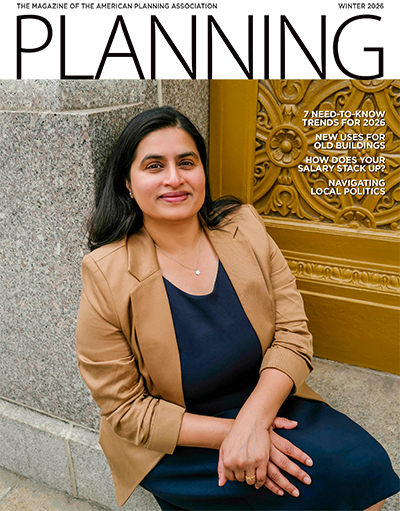July 30, 2024
"Imposter syndrome often manifests as wondering: 'Will I ever feel good at my job?' or 'Do I actually know what I'm talking about?' And we happen to work in a field that is riddled with opportunities for imposter syndrome to kick in," says Gabby Hart, AICP, senior associate at Clarion Associates in Denver. Hart speaks to the pitfalls of doubting one's qualifications and why it's important to overcome it during a conversation with Sophia Burns, content associate at the American Planning Association (APA). She also talks about the importance of acknowledging imposter syndrome and staying motivated when experiencing pushback. This conversation is part of Short Takes, a miniseries of the APA Podcast recorded onsite during the APA 2024 National Planning Conference in Minneapolis.
This interview has been edited for length and clarity, but you can listen to the complete conversation at planning.org/podcasts or wherever you get your podcasts.
BURNS: We hear so much about imposter syndrome in professional circles. What's your experience with it in planning?
HART: I'm in year seven of my planning career, working in both the public and private sectors, and I found myself wondering why I still feel a bit unsure of all that experience. One likely factor is imposter syndrome. Sure, it's a bit of a buzzword — but planners love buzzwords!
In planning, there's public scrutiny. Despite our best efforts to convince people that we do this job to make their lives better and not worse, the public can be brutal in their evaluation of your qualifications.
But we have to remember that we're dealing with some big pieces of people's day-to-day lives. Whether it's their home, their commute to work, their local park, or their community at large, we should expect that they have a lot of passion. And if we set that expectation for ourselves to have a bit of pushback, we're less likely to feel that jab to our professional gut.
BURNS: What's your advice for planners experiencing imposter syndrome?
HART: It's important to take a step back, organize your thoughts, prioritize the big stuff, and always ask for help when you need it. I know I've totally ad-libbed the answer to a question at a public meeting because of those three little words that are so hard to say, "I don't know."
"Try not to forget your own humanity amidst all of our work for other humans. You're not an imposter — you're a planner."
BURNS: What does it mean to the public when a planner admits they don't know something?
HART: Did you know that it's quite literally impossible for one human to know all of the things? But it feels so uncomfortable to respond to questions we get from the public, elected officials, or even colleagues with, "I don't know." Take comfort in knowing that it is an acceptable answer, and not knowing an answer does not mean that you are bad at your job.
If you're not saying, "I don't know" or "sorry," you are giving an answer that you're not confident in, and you're setting yourself up to feel guilty. And, on the receiving end, people can get frustrated if it ends up that you gave them an incorrect answer or that you set their expectations in a way that you shouldn't have. Honestly, for ourselves and our jobs, it's a chance to learn something new and to learn from other departments or members of the public. And it shows the public that we do care about the information we're giving them.
BURNS: These are great tips for dealing with imposter syndrome in the moment. What about lingering doubts one might have about their abilities or qualifications?
HART: Fundamentally, imposter syndrome is a psychological experience. If you're feeling that way, it can be a pretty lonely experience. Being able to talk about it and hearing about it from colleagues, you might feel less alone. It's an opportunity for us to have some productive feedback and maybe some positive reinforcement.
BURNS: If you could make an addition to your planning education that would combat imposter syndrome, what would it be?
HART: I think we all come out of planning school really ready and raring to go change the world. You have to reframe your perspective and be ready for dreams to get crushed. That might be the title of the course: "How to Crush Dreams." You can give the best planning advice in the world, but you are likely to find people who don't want to hear it or push back against it or misunderstand it. And, if you're ready to experience that and you're ready to respond to it, it feels less doom and gloom.
I think as long as we stay passionate about what we do, planners are really, really good at problem-solving, so I think we can end up finding that sort of dream scenario that's rooted in reality. This whole thing is to say, try not to forget your own humanity amidst all of our work for other humans. You're not an imposter — you're a planner. And I'm confident you will continue to do great things.




